#transparency in agriculture
Explore tagged Tumblr posts
Text
Ways to Help Tea Farmers for Sustainable Tea Farming in Kenya
Explore the challenges and opportunities in Kenya’s tea industry as smallholder tea farmers face rising costs, corruption, and the need for sustainable practices. Discover how government support can revitalize this vital sector. Kenya’s tea industry is a key player in the global market, but smallholder farmers are struggling. Learn about the impact of rising costs, corruption, and the potential…
#Agricultural Innovation#climate change#community impact#cooperative farming#corruption in tea sector#crop diversification#direct tea sales#economic impact#fair compensation#farmer empowerment.#farmer training#government support#Kenya Tea Industry#KEPHIS certification#market demands#rising costs#Rural development#smallholder farmers#smallholder income#sustainable practices#tea cultivation#tea exports#tea farming challenges#tea farming sustainability#tea industry reforms#tea market trends#tea production#technology in farming#transparency in agriculture#value-added opportunities
0 notes
Text
Jamshedpur DM Ananya Mittal Convenes Meeting to Boost Fisheries Scheme
New beneficiaries added to PMMSY as committee reviews progress PMMSY implementation in East Singhbhum gains momentum with inclusion of new beneficiaries and plans for additional advertisement to attract eligible candidates. JAMSHEDPUR – District officials convene to assess and improve the Pradhan Mantri Matsya Sampada Yojana’s influence in the region. The Pradhan Mantri Matsya Sampada Yojana…
#agricultural sector growth#Ananya Mittal District Magistrate#aquaculture scheme progress#जनजीवन#District Level Committee meeting#East Singhbhum fisheries#fisheries development Jamshedpur#government scheme transparency#Life#new beneficiaries selection#PMMSY implementation#rural development initiatives
0 notes
Text
PET Sheets Manufacturer & Supplier for Industries Worldwide: Lyka Global Plast

In today's industrial landscape, the demand for high-quality and versatile materials is ever-increasing. One such material that has gained significant prominence is PET (Polyethylene Terephthalate) sheets. Renowned for their exceptional properties, PET sheets are indispensable across various industries. Lyka Global Plast stands out as a leading manufacturer and supplier of PET sheets, serving industries worldwide with unwavering commitment to quality and innovation.
Understanding PET Sheets
Polyethylene Terephthalate (PET) is a thermoplastic polymer resin of the polyester family, extensively used in manufacturing sheets due to its unique combination of properties. PET sheets are known for their excellent mechanical strength, chemical resistance, and clarity. These sheets are lightweight, durable, and highly versatile, making them ideal for a wide range of applications.
Why Choose Lyka Global Plast for PET Sheets?
1. Quality Assurance
At Lyka Global Plast, quality is not just a promise; it is a commitment. Our PET sheets undergo rigorous quality control processes to ensure they meet the highest industry standards. From raw material selection to the final product, every step is meticulously monitored to deliver sheets that exhibit superior performance and longevity.
2. State-of-the-Art Manufacturing Facilities
Equipped with advanced manufacturing facilities, Lyka Global Plast leverages cutting-edge technology to produce PET sheets of unparalleled quality. Our state-of-the-art machinery and skilled workforce enable us to cater to diverse industrial needs with precision and efficiency.
3. Wide Range of Applications
PET sheets from Lyka Global Plast find applications across a multitude of industries. Whether it's packaging, automotive, electronics, construction, or signage, our PET sheets are designed to meet the specific requirements of each sector. Their exceptional clarity and chemical resistance make them ideal for packaging, while their mechanical strength is highly valued in automotive and construction applications.
4. Customization and Flexibility
Understanding that different industries have unique needs, we offer customization options for our PET sheets. From varying thicknesses to different dimensions, we provide tailored solutions that align perfectly with our clients' requirements. Our flexibility in manufacturing ensures that we can accommodate both small and large orders efficiently.
5. Sustainability Commitment
Sustainability is at the core of Lyka Global Plast's operations. Our PET sheets are recyclable and environmentally friendly, contributing to a circular economy. We are committed to reducing our carbon footprint and promoting sustainable practices across all stages of production.
Applications of PET Sheets
1. Packaging Industry
PET sheets are extensively used in the packaging industry due to their clarity, strength, and chemical resistance. They are ideal for food and beverage containers, blister packaging, and clamshells, ensuring product safety and integrity.
2. Automotive Industry
In the automotive sector, PET sheets are utilized for interior and exterior components due to their durability and resistance to impact and weathering. They contribute to lightweighting vehicles, enhancing fuel efficiency and performance.
3. Electronics Industry
The electronics industry benefits from PET sheets for their insulating properties and dimensional stability. They are used in displays, protective coverings, and electrical insulation applications, ensuring reliability and safety.
4. Construction Industry
PET sheets are valued in construction for their strength and versatility. They are used in glazing, roofing, and interior applications, providing durability and aesthetic appeal.
5. Signage and Advertising
The exceptional clarity and printability of PET sheets make them a preferred choice for signage and advertising materials. They ensure vibrant and durable displays for both indoor and outdoor use.
Conclusion
Lyka Global Plast is your trusted partner for high-quality PET sheets, serving industries worldwide with excellence. Our commitment to quality, innovation, and sustainability sets us apart as a leading manufacturer and supplier. Whether you need PET sheets for packaging, automotive, electronics, construction, or signage, Lyka Global Plast delivers solutions that meet and exceed your expectations. Explore our range of PET sheets and experience the difference in quality and performance.
#High-quality PET sheets manufacturer for industries#Best PET sheets supplier for global markets#Custom PET sheets manufacturer and exporter#Eco-friendly PET sheets for sustainable packaging#PET sheets for food packaging and safety#Durable PET sheets for automotive applications#Transparent PET sheets for electronics industry#UV-resistant PET sheets for construction projects#Printable PET sheets for signage and advertising#Affordable PET sheets supplier for bulk orders#PET sheets manufacturer for industrial use#PET sheets supplier with global shipping#PET sheets manufacturer with customization options#PET sheets for pharmaceutical packaging#Heat-resistant PET sheets for industrial applications#Lightweight PET sheets for aerospace industry#Impact-resistant PET sheets for automotive parts#PET sheets for greenhouse and agriculture#Recyclable PET sheets for environmental sustainability#PET sheets with FDA approval
0 notes
Text
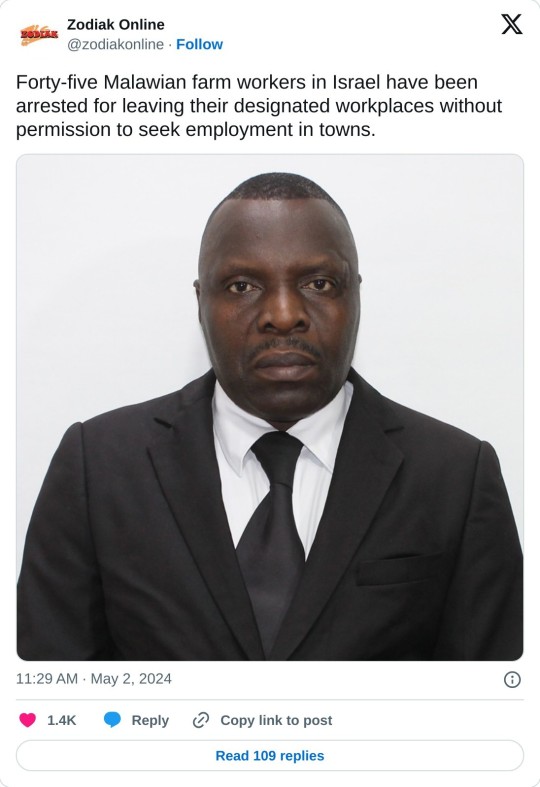
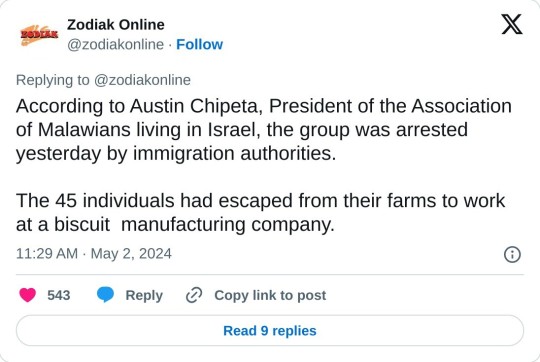
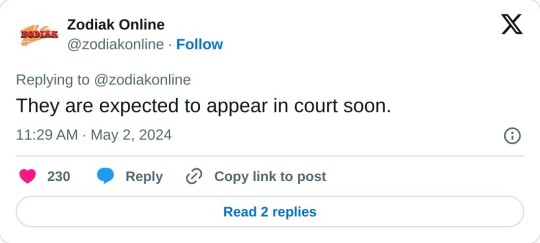
The Malawi government has finally spoken out on the arrest of Malawian farm workers in Israel, clarifying that 12 out of 40 individuals detained are from the country. According to Minister of Information Moses Kunkuyu, the 40 individuals, representing 13 nationalities, were arrested for leaving their designated work stations and seeking employment in town without proper authorization. Kunkuyu revealed that the group, including the 12 Malawians, had abandoned their farm work to seek jobs at a bakery in Bnei Brak, violating Israel’s labor laws and regulations.
Malawi and Israel signed a labor export deal in 2022, allowing Malawi to send unskilled laborers to Israel to work in various sectors, including agriculture and construction. The deal aimed to generate more foreign exchange revenue for Malawi and provide employment opportunities for its citizens. Under the deal, Malawian workers are expected to work in Israel for a maximum of 5 years, with a minimum salary of $1,500 per month. The deal also includes provisions for workers’ safety, health insurance, and protection from exploitation. However, the deal has faced criticism and controversy, with some opposition politicians and human rights organizations expressing concerns about the secrecy surrounding the deal and the potential risks to workers’ safety.
The arrest of the Malawian workers has raised concerns about the treatment of foreign workers in Israel and the effectiveness of the labor deal in protecting their rights. Human rights organizations have called on the Malawian government to take action to ensure the safe return of the detained workers and to review the labor deal to prevent similar incidents in the future. The incident has also sparked debate about the benefits and risks of labor export deals and the need for greater transparency and accountability in such agreements.
The mistreatment of foreign workers in Israel is well documented and would explain why the 45 workers escaped the farm to look for work elsewhere
#yemen#jerusalem#tel aviv#current events#palestine#free palestine#gaza#free gaza#palestine news#news update#malawi#human rights#worker rights#edited#thailand
8K notes
·
View notes
Photo
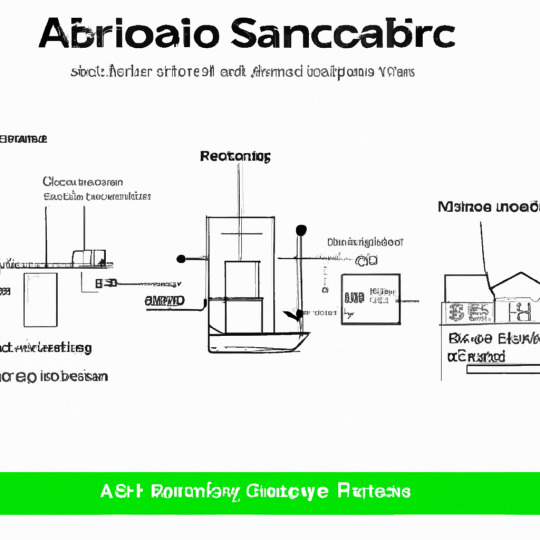
It was in East and Southern Africa that the paper wrap-up started to reveal something unusual. The agritech and fintech providers in the region had become a powerful symbol of progress and prosperity. Despite its promise of empowerment, this landscape assessment was not an easy task. It was like trying to uncover every mystery and secret that lived within the microfinance paper wrap-up. Who were the real movers and shakers? There were powerful players at play, some of them unknown, others hidden in the shadows of the agritech and fintech providers. Perhaps one day, the truth behind this enigmatic landscape assessment will be revealed.
#Africa#Agriculture / Rural Finance#SMEs#Technology#Transparency#Trends/Challenges#Africa FinTech#AgriTech#DFIs#East and Southern Africa#MSMEs#fault#Agritech#Fintech#East#Southern Africa#IFAD
0 notes
Text
Agriculture drones are revolutionizing the industry, ▪Allowing farmers to map fields, ▪Monitor crop health, ▪Apply Pesticides with Precision.
#agoverse#supplychain#agriculture#transparency#globalmarkets#blockchainagriculture#BlockchainInnovation#sustainablefood#drone#droneinagriculture#crophealth#pesticides#AgricultureDrones#FarmingRevolution#StreamliningOperations
1 note
·
View note
Text

[ID: A group of pastry pinwheels on a blue plate next to a bowl of yoghurt garnished with parsley. End ID]
صفيحة يافاوية / Safiha yafawiyya (Yaffan pinwheels)
The dish
صَفِيحَة يَافَاوِيَّة ("ṣafīḥa yāfāwīyya") is a type of safiha, or flatbread, believed to have originated in the coastal city of يافا (yāfā; "Yaffa," sometimes "Jaffa"). While other versions of safiha consist of a flat piece of dough topped with meat, Yaffan safiha are made by rolling dough out to a transparent thinness, folding it to enclose a filling of meat or spinach, and then whirling it around into a pinwheel shape. More highly valued in Yaffa than flat safiha, Yaffan safiha inspires proprietary feelings amongst residents and emigrants. The technique has, however, spread to other areas in Palestine, as well as to Alexandria, Egypt, where a large number of Yaffan exiles have resettled.
Yaffan safiha may also be called "حواية" ("ḥawāya"), after a kind of towel that is stitched into a spiral and placed on top of the head to cushion it while carrying jugs of water, or trays that are hot from the oven. One Yaffan woman remembers her mother assembling these pastries at home and then bringing them, in a large copper tray, to the baker, so they could be cooked in a shared oven for a small fee. The baker's wife would have to wait to use the oven another day. The usage of communal ovens by those who do not have an oven in their home is still common practice in rural areas of Palestine.
Traditionally, the dough used to make Yaffan safiha includes only flour, salt, oil, and water. Some modern Palestinian recipes leaven the dough with baking powder; or include milk powder as a way to use food aid from NGOs, which seek to alleviate the effects of the Israeli occupation's extreme restriction of transport, travel, and agricultural activities on Palestinians' diets. With a spinach filling and without milk powder, the safa'ih may be described as "صيامي" ("ṣiyāmī): a word derived from "صِيَام" ("ṣiyām"; "fast") but which, due to the abstention from meat mandated during the Lenten fast, is colloquially used to mean "vegetarian."
Golden brown and fragrant with olive oil, these safa'ih combine layers of crisp, flaky dough with a savory, well-spiced filling. Recipes for both a 'meat' and a spinach filling are provided. A side of yoghurt and a garnish of mint round out the flavors of the filling and add tanginess and textural contrast.
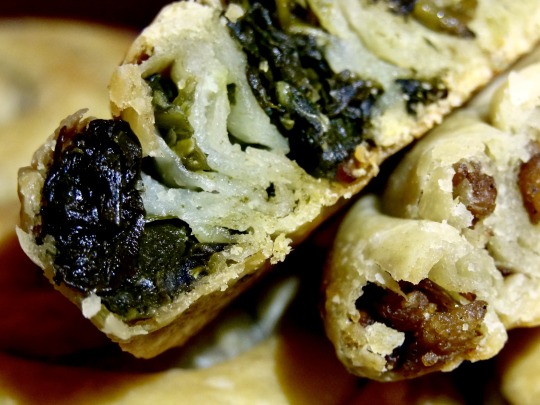
[ID: Close-up of two pinwheels cut open to reveal a spinach filling and a 'meat' filling between thin layers of pastry. End ID]
The Bride of Palestine
Yaffa is a port city with an ancient history which, until the 20th century, was the largest Arab city in, and the cultural and economic capital of, Palestine. For this reason it has sometimes been called عروس" "فلسطين ("'arūs filasṭīn"); "The Bride of Palestine." With the 1909 founding of the nearby Tel Aviv, Yaffa began to be considered its "twin" or "sister" ("האחיות") city; it had a distinctly Arab character where Tel Aviv was almost entirely Jewish. Yaffa was thus considered in disctinctly racialized terms: both attraction and threat; a source of authentic rootedness in the land which could be tapped, but also a potentially contagious bastion of Oriental "weak[ness]" ("חליש").
Yaffa had been a popular destination for culinary tourism in Mandate Palestine, with young settlers heading to the seaside to escape from religious studies and religious dietary restrictions—associated with diaspora Judaism and a lack of connection to a homeland—and to eat earthier Arab foods such as hummus, falafel, kebab, and ful.
In 1948, Zionist paramilitary organization Irgun dropped several tons of British bombs on major civilian areas of Yaffa in order to overwhelm resistance and empty the city of its Arab population; they destroyed the much of the Old City in the process. The neighborhood of المنشية (Manshiya) was destroyed shortly thereafter. Beginning in December of 1948, Yaffa was, part by part, annexed to Tel Aviv.
Today, despite the annexation and the Hebraization of the street signs, Yaffa maintains an Arab character in popular discourse. The call to prayer is heard in the streets, and the أبو العافي (Abulafia) bakery and أبو حسن (Abu Hassan) hummus restaurant and remain where they have been since the 1760s and 1970s, respectively. But increasing gentrification, rising rent prices, cafes and restaurants which cater to tourists and settlers, and the construction of Jewish-only residential projects threaten to continue the ethnic cleansing of the ancient city.
Yaffan Cuisine
Israeli occupation has tended to collapse some of the regional distinctions within Palestinian cuisine, as Palestinians are forced into exile or else crowded into Gaza and into smaller and smaller enclaves within the West Bank. Some dishes, however, still have variations that are associated with particular cities. Stuffed red carrots (محشي الجزر الأحمر; "maḥshi al-jazar al-'aḥmar"), cored and filled with rice and spiced meat, are a dish common throughout Palestine but cooked differently everywhere: in a sauce of lemon juice, pomegranate molasses, and red tahina in Gaza; in tamarind paste in Al-Quds and Ramallah; and in orange juice in the orange-rich Yaffa region. Abu Hassan restaurant serves مسبحة (msabbaha), a Yaffan classic in which chickpeas and tahina are mixed with green chili pepper, and lemon juice.
Donate to an evacuation fund
Buy an eSim for use in Gaza
Help Anera provide food in Gaza
Ingredients:
For the dough (makes 32):
500g flour (4 cups + 1 Tbsp)
1 tsp table salt
2 Tbsp olive oil
Enough water to form a soft, tacky dough (about 1 3/4 cup / 500mL)
For the meat filling (makes 16):
125g vegetarian ground beef (as a substitute for minced lamb)
1 small yellow onion, minced
1 Tbsp olive oil
1/2 tsp ground allspice
1/2 tsp ground black pepper
1/2 tsp ground cardamom
1/2 tsp table salt, or to taste
1/2 Tbsp ground sumac
1/2 Tbsp pomegranate molasses (optional)
For the spinach filling (makes 16):
500g spinach, washed and chopped
1 tsp kosher salt, for removing water
1 small yellow onion, minced
1 Tbsp olive oil
1/4 tsp ground black pepper
1/4 tsp table salt, or to taste
Squeeze of lemon juice
1 tsp shatta (hot red pepper paste)
1/2 Tbsp pomegranate molasses (optional)
Some recipes include sumac in the spinach filling, but this is not considered traditional.
Instructions:
For the dough:
1. Measure dry ingredients into a large mixing bowl. Add oil and mix briefly. Add water, a little at a time, until the dough comes together into a slightly tacky ball. Knead for five minutes, until smooth and elastic.
2. Divide dough into 16 balls of about 50g each. Roll it out into a cylinder and cut it in half repeatedly; or weigh the dough using a kitchen scale and divide by 16.
3. Pour some olive oil in a tray or baking sheet and coat each dough ball. Leave them on the tray, covered, to rest while you prepare the fillings.

For the meat filling:
1. Heat 1 Tbsp olive oil on medium-high. Add meat and fry, stirring often, until nearly cooked through.
2. Add onions, salt, and spices and fry until onion is translucent.
3. Remove from heat. Stir in sumac and pomegranate molasses. Taste and adjust. Let cool.
For the spinach filling:
1. Mix spinach with salt and let sit 10-15 minutes. Squeeze to remove excess water.
2. Heat 1 Tbsp olive oil in medium-high. Fry onion, salt, and pepper for a minute until translucent.
3. Combine all ingredients. Taste and adjust salt.
To assemble:
1. Oil a clean work surface, as well as your hands. Spread a dough ball out into a very thin, translucent circle by repeatedly patting with your fingers while pushing outwards. Be sure to push outwards from the center so that the circle does not become too thin at the edges. A few small holes are okay, since the dough will be folded and rolled in on itself.
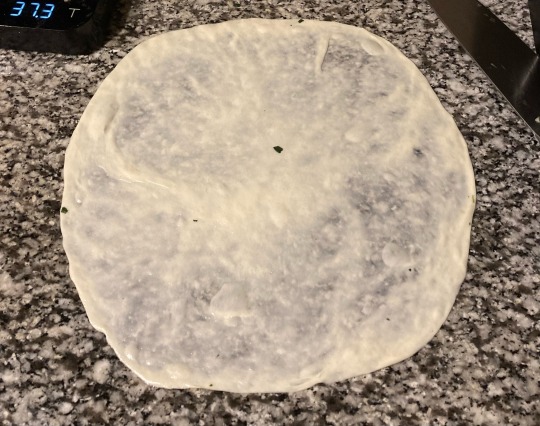
2. Cut the circle in half with a sharp knife. Spread 1/16 of either filling in a thin line along the cut edge, leaving a margin of 1 cm (1/2") or so.
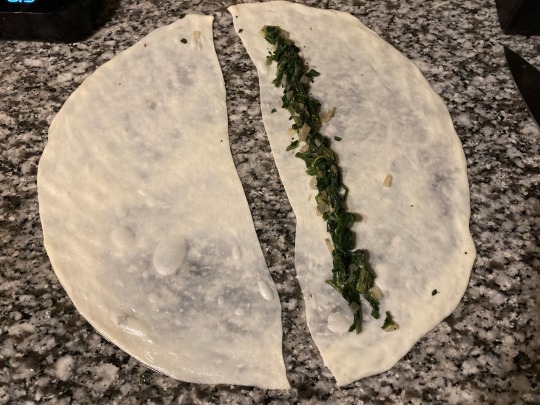
3. Roll the edge of the dough (the cut edge) over to encase the filling. Continue rolling, trying as much as possible to exclude air, until you have a long rope of dough.
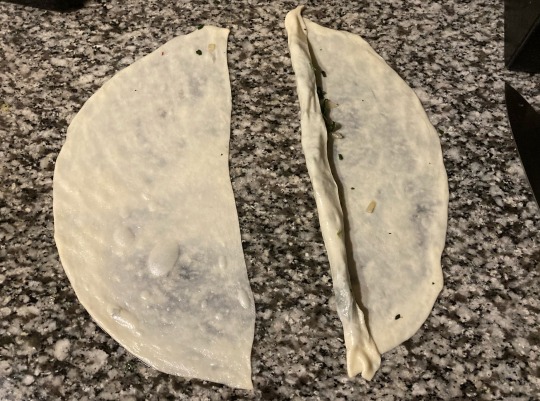
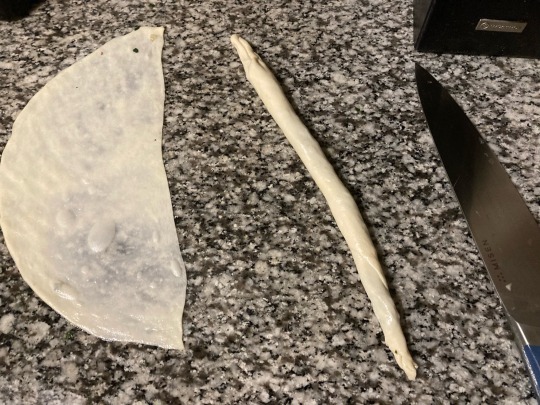
4. Roll the rope around in a tight spiral. Tuck the very end of the dough underneath and press to seal. Place on a preparing baking sheet.
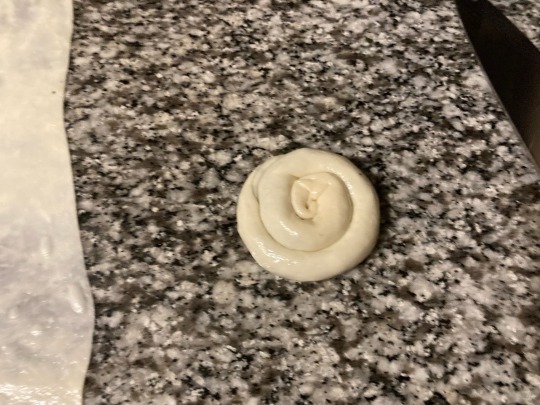
5. Repeat until the filling and dough are used up. Meanwhile, preheat an oven to 375 °F (190 °C). Bake the safiha in the top third of the oven for 25-30 minutes, or until golden in color.
Serve warm with yoghurt.
594 notes
·
View notes
Text
One Poem a Day: September
"beautiful" words related to September for your next poem/story

September - ninth month of the Gregorian calendar. Its name is derived from septem, Latin for “seven,” an indication of its position in the early Roman calendar.
Apple-polish - to use flattery or the doing of favors in order to win approval especially from a superior
Anecdotage - the telling of anecdotes (i.e., a usually short narrative of an interesting, amusing, or biographical incident)
Ardency - depth of feeling
Auburn - of a reddish-brown color
Autumnity - quality or condition characteristic of autumn
Bucolic - of, relating to, associated with, or typical of open areas with few buildings or people; idyllic
Cathexis - investment of mental or emotional energy in a person, object, or idea
Ceres - the Roman goddess of agriculture
Churn Supper - a feast at the end of the hay harvest
Cider - fermented apple juice often made sparkling by carbonation or fermentation in a sealed container
Cornucopian - being more than enough without being excessive
Demeter - the Greek goddess of agriculture
Effulgence - radiant splendor; brilliance
Estivo-autumnal - relating to or occurring in the summer and autumn
Felicific - causing or intended to cause happiness
Fête - a lavish often outdoor entertainment
Gemütlich - agreeably pleasant; comfortable
Georgic - a poem dealing with agriculture
Harvest - the season for gathering in agricultural crops
Hearthstone - the place where one lives
Husbandry - the cultivation or production of plants or animals
Moon (away) - to spend in idle reverie; dream
Odeum - a small roofed theater of ancient Greece and Rome used chiefly for competitions in music and poetry
Prosaic - being of the type that is encountered in the normal course of events
Reposeful - of a kind to induce ease and relaxation
Rubicundity - ruddy (i.e., having a healthy reddish color)
Sapphire - a gem variety of corundum in transparent/translucent crystals of a color other than red; a deep purplish-blue color
Surfeit - an intemperate or immoderate indulgence in something
Torridity - parched with heat especially of the sun; hot
Victual - to supply with food
Sources: 1 2 3 ⚜ More: Word Lists
If any of these words inspire your writing, do tag me or send me a link. I'd love to read your work!
#word list#september#writing prompt#dark academia#spilled ink#writeblr#writers on tumblr#poets on tumblr#poetry#literature#langblr#linguistics#words#light academia#lit#autumn#writing inspiration#writing ideas#writing inspo#creative writing#writing reference#rene magritte#surrealism#landscape#nature#moon#writing resources
103 notes
·
View notes
Text
Oooh damn this is REALLY getting bad. Thank you to the brave whistleblowers speaking out about these horrible conditions.
The Dolphin Company apparently is unable to pay their staff and feed their animals, despite being a massive corporation with multiple parks around the world.
Shut MSQ down and give those animals to facilities that actually can look after them properly. I really feel for the trainers who are trying to do their job while facing such horrible conditions - and not even getting paid!
It’s always wages that are the first to be cut, then the animal’s food…. But what about the salary of the CEO I wonder?
Also I’m extremely disappointed in both AMMPA and IMATA for their complete lack of transparency and apparent refusal to speak out publicly and withdraw their accreditations. It completely invalids their accreditation and accreditation process that a facility like MSQ - with multiple USDA violations - can still be holding any accreditation, let alone the “gold standard”.
38 notes
·
View notes
Text
Listening to the Joe Rogan/Elon Musk podcast for the data gathering purposes, and you do have to hand it to Musk that this is him in his element, and you can see the weakness of politicians like Harris (or Trump) in comparison. The entire first 10 minutes is about video games, talking about (somewhat dubious but not awful) studies about how they boost surgeon's capabilities, how they compare to golf, and so on, with no stress that this is "filler", of a need to Get To The Pitch. He adds on, goes on his own tangents but they are always "idea tangents" Rogan can bounce off of. Rogan will jump in on how creatine helps people deal with sleep dep Because Studies and he yes-and's the fuck out of him asking questions and talking about his breakfast habits. The "I could have a beer with him" crowd is real, they actually value it, and tbh modern Dems struggle with it due to the PR Filter. And Trump is a deranged lunatic, little hard for him to pull it off these days. But Musk has it and you can see his value for a niche as a campaign surrogate.
Anyway on the creatine topic at one point when explaining "why They don't know this" Musk blames opposition to meat consumption, and tangents a little to let everyone know that meat consumption has absolutely zero contribution to global warming, noting "how would you even measure that? You can't". Amusing given all the decades of measurements of the emissions of the agricultural sector:

And input/production analysis of per-good emission rates:

Like obviously you get varying estimates but this isn't mysterious, carbon emissions are well understood and not typically difficult to calculate.
And I just, idk, I think it's amusing, watching someone pivot from casual conversation that is perfectly humanizing to transparent lies that he either did know better about but forgot due to Culture War Brain or, more likely imo currently does know are bullshit but doesn't care. I expect these things in a stump speech; it is off-putting in a hangout sesh.
35 notes
·
View notes
Text
The Bill and Melinda Gates Foundation is a major influencer and funder of agricultural development in Africa, with little accountability or transparency. Leading experts in food security and many groups in Africa and around the world have critiqued the foundation’s push to expand high-cost, high-input, chemical-dependent agriculture in Africa. Critics say this approach is exacerbating hunger, worsening inequality and entrenching corporate power in the world’s hungriest region.
This fact sheet links to reports and news articles documenting these concerns.
[...]
What are the main critiques of Gates Foundation’s agricultural program?
The Gates Foundation’s flagship agricultural program, the Alliance for a Green Revolution in Africa (AGRA, which recently rebranded to remove the term “green revolution” from its name), works to transition farmers away from traditional seeds and crops to patented seeds, fossil-fuel based fertilizers and other inputs to grow commodity crops for the global market. The foundation says its goal is to “boost the yields and incomes of millions of small farmers in Africa… so they can lift themselves and their families out of hunger and poverty.” The strategy is modeled on the Indian “green revolution” that boosted production of staple crops but also left a legacy of structural inequity and escalating debt for farmers that contributed to massive mobilizations of peasant farmers in India.
Critics have said the green revolution is a failed approach for poverty reduction that has created more problems than it has solved; these include environmental degradation, growing pesticide use, reduced diversity of food crops, and increased corporate control over food systems. Several recent research reports provide evidence that Gates-led agricultural interventions in Africa have failed to help small farmers. Critics say the programs may even be worsening hunger and malnutrition in Southern Africa.
34 notes
·
View notes
Text
Very interesting new and different business models and business ideas for rural markets in global North.
Millennial Farmers: The New Fashion Pioneers
One of the most exciting aspects of this movement is the connection between millennial farmers and the fashion industry. Here are some real-life examples.
• Regenerative agriculture for textiles in which millennial farmers are increasingly adopting practices focused on improving soil health, conserving water and sequestering carbon. Some farms are now growing cotton, flax and other fibers using regenerative techniques. These materials are used in fashion and represent a significant shift away from traditional, resource-intensive farming.
• The use of organic and eco-friendly dyes in textile production is on the rise. Many millennial farmers are experimenting with plant-based dyes — such as indigo — and incorporating them into fashion. These natural dyes not only reduce the environmental impact but also create unique, earthy colors.
• Farms that raise animals for wool, leather and other textiles are taking a more ethical approach. By ensuring the welfare of the animals, these farmers are producing high-quality, sustainable materials for fashion brands that prioritize animal welfare.
• Millennial farmers are embracing the direct-to-consumer model, much like they do with farm produce. They sell fibers and materials directly to fashion brands, cutting out intermediaries and ensuring transparency in the supply chain. This connection appeals to fashion brands that want to know where their materials come from.
• Millennial farmers are also choosing to wear and support sustainable fashion brands that align with their values. It’s a way of living the principles of slow living not just in farming but in every aspect of their lives.
#solarpunk#solarpunk business#solarpunk business models#solar punk#farmers#slow life#sustainable lifestyles#rural
16 notes
·
View notes
Text
Trump Watch #9
Trump has named the following:
Linda McMahon as secretary of education.
McMahon is a wrestling billionaire and co-founder of WWE.
She has long been a supporter of Trump and served in his first administration as leader of the Small Business Administration.
She has served on the Connecticut Board of Education and the board of trustees for Sacred Heart University in Connecticut.
She supports charter schools and school choice.
Scott Bessent for treasury secretary.
Bessent is a billionaire who advised Trump on economic policy during his campaign; he has experience founding and working for hedge funds.
If confirmed he will be the first LGBTQ+ Senate-confirmed cabinet member in a republican administration.
He supports extending Trump’s tax cuts and deregulation.
He also supports Trump’s embrace of the crypto industry.
Russell Vought for the Office of Management and Budget (OMB).
Vought held the same position during Trump’s first term.
He is a key architect from Project 2025 writing the chapter on the Executive Office within which he takes aim at federal regulatory agencies that are not under control of the White House..
He is a strong advocate for recess appointments of Trump’s nominees.
Lori Chavez-Deremer as labor secretary.
Chavez-Deremer was the first Latina congresswoman of Oregon; she lost re-election in November.
She co-sponsored the Protecting the Right to Organize (PRO) Act which would make it easier for workers to unionize.
She has strong support from unions.
Pam Bondi as attorney general.
Bondi is the Florida attorney general and is the first woman to hold the position.
As FL state attorney general she brought cases against the Affordable Care Act and fought to maintain FL’s ban on same-sex marriage.
She is a longtime ally of Trump, served as a chairwomen of America First Policy Institute, and defended Trump during his first impeachment trial.
She received a $25,000 donation from Trump’s charitable foundation and subsequently her office dropped a suit against Trump’s company for fraud stating there were insufficient grounds to proceed. A prosecutor assigned by then-Gov. Rick Scott determined there was insufficient evidence to support bribery charges.
Brook Rollins as secretary of agriculture
Rollins is a co-founder and president of think tank America First Policy and served as assistant to the president for intergovernmental and technology initiatives during Trump’s first administration.
She is a lawyer with an undergraduate degree from Texas A&M University in agricultural development.
Dr Marty Makary as Food and Drug Administration commissioner.
Makary is a surgeon and public policy researcher at Johns Hopkins University.
He supports RFK Jr. as Trump’s pick for HHS.
He worked with the first Trump administration on transparent billing in health care.
He opposed COVID vaccine mandates and was a critic of public health measures during the pandemic.
Dr Janette Nesheiwat for Surgeon General.
Nesheiwat is a physician, medical director at CityMD, and former Fox News medical contributor.
She is a supporter of vaccines.
Dave Weldon to direct the Centers for Disease Control and Prevention.
Weldon is a physician, Army veteran, and former Republican Florida representative.
As a congressman he introduced the Weldon Amendment which provides protections for health care workers and organizations that do not provide or aid in abortions.
Scott Turner for secretary of Housing and Urban Development.
Turner previously served in the Texas House of Representatives; he is a NFL veteran and motivational speaker.
He led the White House Opportunity and Revitalization Council during Trump’s first term and currently works as chair of the Center for Education Opportunity at America First Policy Institute.
Republicans also announced plan to create a GOP-controlled subcommittee, Delivering on Government Efficiency, to work with the Department of Government Efficiency on cutting government waste; the committee is to be chaired by Marjorie Taylor Greene.
#democrat#democratic party#republican#republican party#donald trump#trump#us politics#politics#democracy#liberals#conservatives#department of government efficiency
9 notes
·
View notes
Note
*points at AOC in the picture* there's one
I don't get people saying, as a fact, that AOC is a centrist.
I think it stems from people conflating "centrist" and "not as far left as I am."
Can/should people be dissatisfied with AOC's success, or lack thereof, in the Congress? Sure.
But looking through the bills she's proposed in the past 2 months, we've got:
Banning the death penalty in all circumstances
Raising taxes on the rich to fund social security (from a press release, the text of the bill isn't digital yet)
Getting rid of agricultural exemptions to the FLSA, increasing rights and protections
Federally codifying contraception rights
Taxes on Wall Street Speculation Trading
Free public college or trade school for everyone who doesn't have a degree at state school
Strengthening child labor laws following Republican bullshit
Shifting charter school structure for public accountability and transparency
Increased support for mental healthcare and suicide prevention
Reinstating the Child Tax Credit, which previously cut the child poverty rate in half
Allowing psychedelics to be used in mental healthcare
Changing the law so the President can't kick out all citizens above 14 if we're at war with "their country."
Allow local communities first rights on any minerals or deposits located on their land, including allowing community-owned companies to operate any mine(s).
Medicare for all
Increasing the size of the Supreme Court
Addressing racial disparities in maternal mortality rates
Increasing freight rail worker rights
Universal school breakfasts and lunches across the country
All in the past 2 months, plus some bills I didn't state. Maybe the "Well in Europe..." could apply, but a number of these are just left-wing, even in Europe.
You can make tactical complaints against her, or you can say that it's all posturing, which I don't find fully persuasive. But if she is posturing, she's saying the right shit and introducing the right bills, including on things that are not things the Democratic Establishment would want her to say, in my view.
I don't think Nancy Pelosi or her family is a fan bills to tax speculation, increase income taxes on the rich, or give land use rights to local/indigenous communities before Wall Street. I really don't think she's in favor of banning congresspeople from owning/trading stocks.
93 notes
·
View notes
Photo
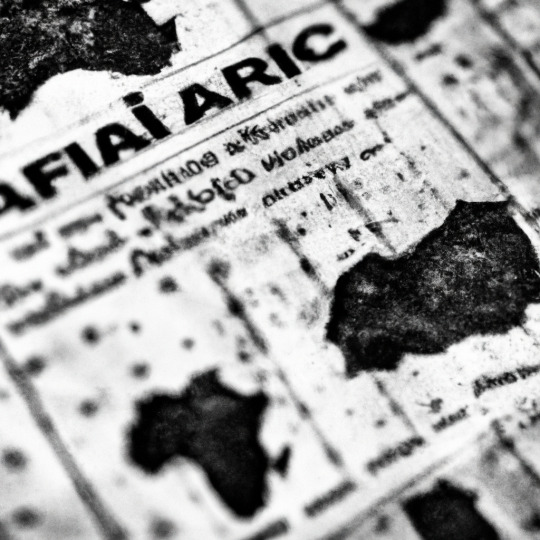
The cities of East and Southern Africa are a tapestry of humanity, a multiplicity of cultures and stories, of dreams shared and dreams forgotten. Within this fabric of thought lurks something else, something unspoken. Agritech and Fintech providers, quietly spreading, in an ever-growing network, their tendrils reaching from bustling metropolises to the humblest of villages. Like the web of a spider, the two providers have suffused the region, a serendipitous partnership from which new possibilities are born. How far the reach of their influence extends, the true implications of their presence, the great microfinance paper wrap-up gives few answers. Still, those that pay attention can feel the silent ripples, can taste the possibilities in the air. For it is well known that great power often lies dormant within the unnoticed, ready to be unleashed.
#Africa#Agriculture / Rural Finance#SMEs#Technology#Transparency#Trends/Challenges#Africa FinTech#AgriTech#DFIs#East and Southern Africa#MSMEs#fault#Agritech#Fintech#East#Southern Africa#IFAD
0 notes
Text
Agoverse is a blockchain-based platform that connects farmers with buyers worldwide.
A secure and transparent marketplace for selling products
Access to financial resources through our Agolend lending platform
Real-time data and insights to help farmers make informed decisions
A community of farmers and experts who can share knowledge and support each other
Agoverse is also revolutionizing how farmers and vendors connect with their target audience. Our patent-pending blockchain advertising system allows farmers to reach their target audience with targeted ads that are more effective and efficient.
Join the Agoverse community today and start empowering agriculture through blockchain!
https://agoverse.com/
#FarmersUnite#BlockchainAgriculture#supplychain#agriculture#transparency#sustainablefood#foodtraceability#BlockchainInnovation#Global#globalmarkets#globalnetworkingevent#consumer
1 note
·
View note